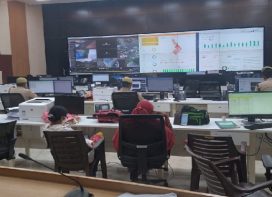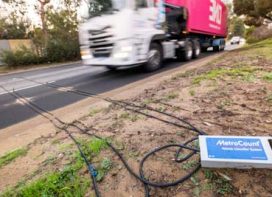 An ambitious road sector project of the Republic of Cape Verde has got a second shot of additional financing by the World Bank to the tune of US$10 million equivalent. The project, called the Road Sector Support Project (RSSP), with a maturity period of 35 years and a grace period of 10 years, aims to increase the mobility of the population of the island country in targeted areas. RSSP, which does not include Intelligent Transportation Systems (ITS), also aims at improving the planning and financing in the road sector through institutional reforms and investment support for primary and rural roads. RSSP promises to be a huge exercise in transport planning and providing infrastructure and will be used to provide Technical Assistance to the Road Institute (IE) of Cape Verde.
An ambitious road sector project of the Republic of Cape Verde has got a second shot of additional financing by the World Bank to the tune of US$10 million equivalent. The project, called the Road Sector Support Project (RSSP), with a maturity period of 35 years and a grace period of 10 years, aims to increase the mobility of the population of the island country in targeted areas. RSSP, which does not include Intelligent Transportation Systems (ITS), also aims at improving the planning and financing in the road sector through institutional reforms and investment support for primary and rural roads. RSSP promises to be a huge exercise in transport planning and providing infrastructure and will be used to provide Technical Assistance to the Road Institute (IE) of Cape Verde.
Guided by the World Bank officials associated with the project, Vidyottama Sharma interviewed Lucio Spencer (Lopes dos Santos), National Coordinator of Cape Verde Road Sector Project, Ministry of Infrastructure and Marine Economy, Praia. Excerpts from the interview:
What is the Road Sector Support Project all about and which roads will be covered by the project?
There are two proposed Additional Financing (AF) Activities in the project. Component One consists of Institutional Support. Under this, the implementation of a programme of activities to strengthen I.E. (road institute) and the Road Fund’s capacity to better perform their respective roles in the management and monitoring of the road sector of Cape Verde will be supported. The strengthening proposed under the AF will have a focus on investment and maintenance planning, contract management and Monitoring and Evaluation (M&E). Support will also be provided to the Project Coordination Office (PCO) to coordinate and monitor the project. The second component deals with Road Infrastructure. This entails carrying out a programme of activities to: i) rehabilitate a portion of the Praia-Cidade Velha road leading to Cidade Velha (6km), ii) rehabilitate about 14km of rural roads: Ribeira Principal (4km) and Ribeira de São Miguel (10km) on the island of Santiago using labour based techniques; and iii) design and supervision of the works.
Who will manage the project?
 The project will continue to be directly managed by the Ministry of Infrastructure, Transport and Telecommunication (MITT) through the PCO. The Road Institute will be responsible for procurement of road rehabilitation as well as selection of consultants for works supervision. Studies and bidding documents are being prepared by consultants that have already been recruited under the RSSP. The existing PCO in charge of the implementation of the RSSP will manage the funds of the additional financing and will prepare the annual financial statements of the projects and quarterly deliver progress implementation reports.
The project will continue to be directly managed by the Ministry of Infrastructure, Transport and Telecommunication (MITT) through the PCO. The Road Institute will be responsible for procurement of road rehabilitation as well as selection of consultants for works supervision. Studies and bidding documents are being prepared by consultants that have already been recruited under the RSSP. The existing PCO in charge of the implementation of the RSSP will manage the funds of the additional financing and will prepare the annual financial statements of the projects and quarterly deliver progress implementation reports.
How will the World Bank supervise such a massive project?
Procurement activities will be carried out in accordance with the provisions of the World Bank’s “Guidelines: Procurement under IBRD Loans and IDA Credit,” May 2004, revised October, 2006 and May 2010 and “Guidelines: Selection and Employment of Consultants by World Bank Borrowers”, May 2004, revised, October 2006 and May 2010. As for supervision, in addition to the prior review to be carried out by the IDA task team, there will be one supervision mission every six months and at least one IDA annual Post Procurement Review (PPR).
How many phases does the project involve?
The RSSP supports two components:
-
 institutional support, including support for the Program Coordination Office, and
institutional support, including support for the Program Coordination Office, and - road infrastructure. The RSSP was scheduled to initially close on August 31, 2010, but the closing date has been extended by 10 months to June 30, 2011. The extension was requested to allow:
- finalisation and early implementation of a few policy measures, and
- processing of the proposed additional finance. The proposed revised closing date is June 30, 2013. The expected contract duration of the Praia – Cidade-Velha contract is 12 months and the same for the rural roads. The contracts are expected to be awarded before mid 2011, and work is expected to be completed by mid 2012. However, possible inadvertent delays and the defect liability period of one year make it advisable to extend the project closing date by two years. All project phases will be concluded by June 30, 2013.
What were the World Bank criteria to give a go-ahead?
This is a 100% government project. The Project Development Objective (PDO) is to increase the mobility of the population in the targeted areas and improve the planning and financing of the road sector. There were a few criteria based on which the World Bank gave its go-ahead. The main was economic analysis.
 Praia-Cidade Velha – The rehabilitation of the Praia–Cidade Velha road includes a 6km long stretch from Praia to the Sao Felipe Fortress (300 metres before the town’s entrance). The road carries tourist traffic to the historic town of Cidade Velha, a UNESCO World Heritage Site and traffic destined for the settlements beyond Cidade Velha. Feasibility analysis was completed for two sections of 3.2km and 2.8km, with annual traffic in the range of 1300 to 1500 vehicles per day. The investment’s main benefits are due to improved travel time and savings in road user costs associated with a better speed and a reduction in vehicle operating costs resulting from improved riding quality. The investment has a positive Net Present Value (NPV) estimated to be around US$1.8 million, using a discount rate of 12% and an overall economic rate of return estimated at 19.2%.
Praia-Cidade Velha – The rehabilitation of the Praia–Cidade Velha road includes a 6km long stretch from Praia to the Sao Felipe Fortress (300 metres before the town’s entrance). The road carries tourist traffic to the historic town of Cidade Velha, a UNESCO World Heritage Site and traffic destined for the settlements beyond Cidade Velha. Feasibility analysis was completed for two sections of 3.2km and 2.8km, with annual traffic in the range of 1300 to 1500 vehicles per day. The investment’s main benefits are due to improved travel time and savings in road user costs associated with a better speed and a reduction in vehicle operating costs resulting from improved riding quality. The investment has a positive Net Present Value (NPV) estimated to be around US$1.8 million, using a discount rate of 12% and an overall economic rate of return estimated at 19.2%.- Cidade Velha’s poverty: In addition to time and cost savings to existing (and generated) traffic, any increase in tourism will benefit the micro economy and women. There is a higher concentration of the poor in Cidade Velha with 39% of the local population living in poverty as compared to the national average of 26.6% (2007 estimate). Further, infrastructure access indicators for the region also suggest a low income population.
- Rural roads: Two rural roads are included for rehabilitation in the proposed AF. Both Ribeira Principal (4km) and Ribeira de São Miguel (10km) are in the north of the island of Santiago, in the mountainous terrain. For these roads, the main objective is to ensure basic access by isolated populations to social, administrative and market opportunities. The two roads connect some isolated but relatively populated rural settlements and important agricultural production areas to the core road network. Currently agricultural production in this area is mostly on subsistence basis, largely as reliable transport of products to markets is not available.
The roads at present are tracks, average three metres wide, with sections either of cobblestone or earth. The proposed rehabilitation will make the road links passable year round through spot improvements and improve the standard of services provided. It will contribute to the economic development of the rural areas through decreased transport costs for agricultural inputs and outputs, and a much improved access to health, education and social centres. The economic analysis methodology for the proposed AF rural road rehabilitation will follow a cost effectiveness approach, as is standard for rural roads, exactly as in the original RSSP.

What other aspects were taken into consideration?
Safety, Environmental Impact and rehabilitation aspects were also considered.
The negative environmental and social impacts of the rehabilitation of the 6km main road to Cidade Velha are very minor and no land acquisition would occur as the rehabilitation would only concern the existing roads and right-of-way is not affected, consequently no compensation is anticipated. Operational Policy (4.11) of the World Bank/IDA concerning Physical Cultural Resources is being triggered for this second AF; the Environmental Impact Assessment (EIA)/Environmental and Social Management Plan (ESMP) for the road to Cidade Velha has been updated to ensure that the civil works carefully avoid existing cultural assets, such as an old cobblestone road and historical church. Guidelines for “chance finds” procedure will be integrated into the contracts for construction and road maintenance consultants. These include development of a cultural property management plan if physical cultural resources are found, in accordance with the government of Cape Verde policies and guidelines.
Regarding the rehabilitation of the 14km rural roads, a preliminary review has been completed and does not indicate any need for involuntary resettlement or land acquisition. Should there be any need for additional resettlement, the ARAP will be updated as and when necessary, once the alignment of the proposed rehabilitation is finalised. The EIA for the original project, which includes rural roads, will also be updated as and when necessary. The environmental aspects are expected to be minimal, while the social impacts are expected to be positive. Any updated EIAs, as well as the ESMPs, will be disclosed in-country, at the PCO and in all municipalities where works are planned. The proposed second AF triggers Operational Policy (4.01) of the World Bank/IDA for Environmental Assessment due to Safeguards performance which was reviewed and found satisfactory. For the original project an Environmental and Social Impact Assessment (ESIA), an ESMP and an Abbreviated Resettlement Action Plan (ARAP) were prepared and approved by the Bank.
Why did World Bank decide to go for additional financing for the project?
 Provision of the proposed AF is necessary to assist in consolidation of the ongoing sector reforms and implementation of the proposed works which are also expected to buttress the economic recovery process.
Provision of the proposed AF is necessary to assist in consolidation of the ongoing sector reforms and implementation of the proposed works which are also expected to buttress the economic recovery process.
A follow-on project to the current RSSP was initially sought by the government of Cape Verde. The proposed activities are, however, an extension of the activities in the original project. An AF instrument was therefore considered better suited, than a stand-alone project, to scale up the development impacts of the ongoing Road Sector Support Project.
The initial total cost of the Road Sector Support Project (RSSP) was estimated at US$17.48 million of which USD$15 million was funded by the International Development Association (IDA)[1]. The first AF became effective on September 15, 2008, and the total IDA credit amount revised to US$20 million after the first additional financing. The reworded objective of the RSSP is to assist the borrower to increase the mobility of the population in targeted areas and improve the planning and financing of the road sector through institutional reforms, and investment support for primary and rural roads. Increased mobility of populations in target areas captures better access to social and economic opportunities while improved planning and financing of the sector reflects better sector management.
Are you satisfied with the work?
Progress on implementation and towards achievement of development objectives has been satisfactory over the last year and is noted in the archived ISRs. All civil works activities have been satisfactorily completed and project funds are almost fully disbursed. There has also been steady progress in advancing the institutional reforms in the road sector seen in a functioning road fund generating approximately ECV 300 million annually, major improvements in the capacity of the National Engineering Laboratory (LEC) to fulfill its mandate, update of the legal mandate of the General Inspectorate of Public and Private Works (IGOPP) and improved capacity in MITT units to support ministerial planning and decision making. Professional staffing at IE has been increased, allowing consolidation of road sector responsibility at IE. The performance based maintenance contracts piloted under the original project have been expanded by IE, with the FR providing the funding. The timely availability of funds for road maintenance through the FR, and the consolidation of sector responsibilities at IE, are creating a sustainable institutional structure for the planning and management of the road network.
Although there were initial delays in the implementation of the institutional strengthening and reform component, the government is committed to completing the reforms and further strengthening sector institutions. Stakeholders in the sector, including MITT, IE and the FR fully support the project and activities proposed under the AF. So far the RSSP has met all relevant World Bank disbursement, procurement and fiduciary obligations as well as complied with all relevant,legal conevnants and safeguards requirements.
 TrafficInfraTech Magazine Linking People Places & Progress
TrafficInfraTech Magazine Linking People Places & Progress


